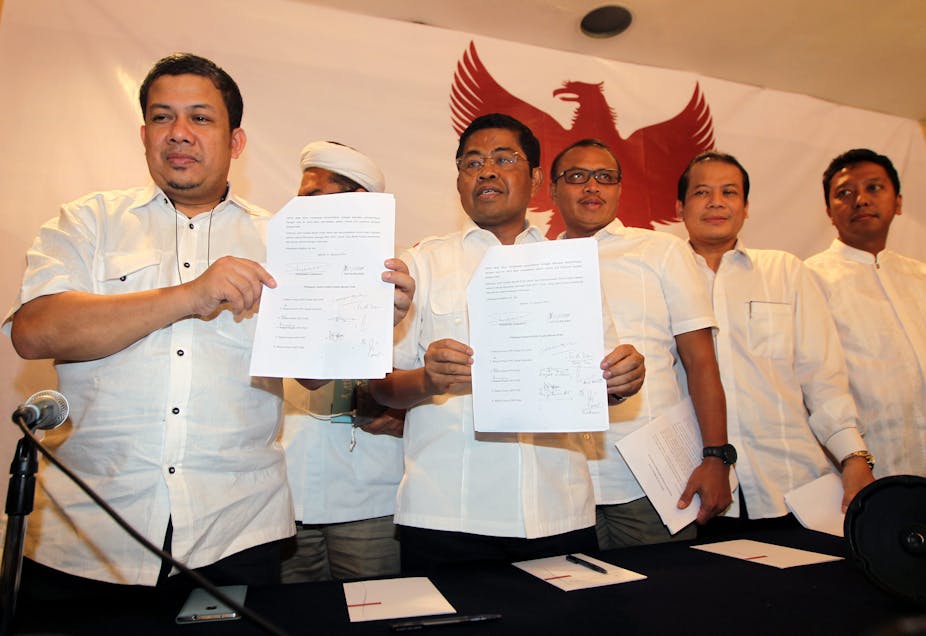Indonesians might lose their rights to directly elect local leaders as opponents of president-elect Joko Widodo are pushing to eliminate direct regional elections.
The Red-White coalition of defeated presidential candidate and Gerindra party chief Prabowo Subianto is proposing a return to indirect elections so legislative councils elect governors, mayors and regents.
The parliament is scheduled to vote for the regional elections bill on September 25. The Red-White coalition holds the majority of seats in the parliament.
Jakarta deputy governor Basuki “Ahok” Tjahaya Purnama recently resigned from his membership in Gerindra in protest at the move. Rising politicians Ridwan Kamil, the mayor of Bandung, and Bima Arya Sugiarto, mayor of Bogor, also reject the proposed return to indirect election.
Jokowi, as Indonesia’s incoming president is popularly called, rose to the national political scene after being elected in 2012 as Jakarta governor with Ahok as his deputy under the direct election system.
What does indirect election mean for Indonesia? What is behind the move?
Read Q&A with Robert Endi Jaweng below:
What is the history of Indonesia’s regional election system?
In Suharto’s New Order regime, the central government in Jakarta appointed regional leaders. The local legislative councils nominated candidates for the president to choose. At that time, Suharto held a monopoly of power. The appointed local heads answered to him.
After popular protests resulted in Suharto’s fall in 1998, Indonesia started to decentralise power to the regions. Between 1999 and 2004, Indonesia implemented representative democracy. Elected local councillors appointed governors, mayors and regents. The local leaders answered to the councillors.
After the passing of the Law of Regional Governments in 2004, Indonesia implemented direct elections for local heads. Since May 2005, voters directly elect their mayors, regents and governor.
Direct elections is actually not a new system in Indonesia. It was introduced and regulated in 1957, two years after the country’s first elections following independence. But it was not implemented at that time due to the volatile political dynamics in the parliament and threats of disintegration of regions in Indonesia.
However, we can see that even in Indonesia’s early years after independence, there was an idea of putting the people at the centre of the country’s democracy.
What is behind the move to eliminate direct elections of local heads?
A regional elections bill has been in the deliberation process since 2007. Deliberation has intensified since 2011. All party factions in the parliament at that time wanted to keep direct elections of local heads.
This changed after the Indonesian Democratic Party of Struggle (PDI-P) won the legislative election in 2014 and Jokowi won the presidency.
Now on one side there is Jokowi with PDI-P and its small coalition with the National Awakening Party (PKB) and People’s Conscience Party (Hanura). The other side is Gerindra and the rest, who together hold 60% of the seats in the parliament.
The Gerindra coalition is looking to salvage power. Because the central government will be controlled by PDI-P, the Gerindra coalition is trying to take over control of the parliament and local politics.
What are the consequences of indirect elections of regional leaders for Indonesia?
There will be grave consequences. There will be a divided government.
The central government will be led by Jokowi and his PDI-P party. Meanwhile, leaders from the opposing political bloc would control the regions. Local heads might challenge Jokowi in implementing reforms by not carrying out national policies.
Indirect elections of local heads also create negative patterns of relationships between regional leaders and councils. Because local heads are accountable to the legislative councils, they would try to please them — not by creating good policies that would benefit the people but by colluding in sharing lucrative projects between themselves. If leaders refuse to collude with councillors, the latter can impeach them, creating an unstable political dynamic in regions.
The public would be marginalised from politics. The emotional relationship between regional leaders and the people that has been formed in the past years would no longer exist.
It would be hard for regions to produce local innovators such as Joko Widodo. These local innovators can only be found by the people and not by political elites.
The deadline for voting to pass this legislation is September 25. But the government can stop the bill. What is President Susilo Bambang Yudhoyono’s reaction to the move by the coalition?
Yudhoyono has two sides in him. The government purports to support direct election, but his party (the Democratic Party) is also opposing it in the parliament. He portrays an image that his government is pro-democracy and pro-direct election. But, silently, his political instruments in the parliament are working to eliminate direct elections.

Yudhoyono should take a stance and not be ambiguous. This is his last test in his presidency to show that he supports democracy.
Can the public challenge the law if the parliament passes it?
Yes. If they pass the law and scrap direct regional elections, the association of regents and mayors as well as a coalition of NGOs that supports direct election will challenge the law in the Constitutional Court.
If that happens, we hope the Constitutional Court would pass its judgement on the case quickly. In 2015, there will be 242 regional elections in Indonesia.

